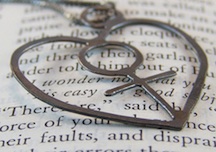In between reading romance novels, I've been gradually making my way through Catherine M. Roach's academic study of the genre, Happily Ever After: The Romance Story in Popular Culture (see my post about the book's opening chapter here). Because Roach is in the unusual (although not entirely unique) position of being both a scholar and a writer of romance, her nonfiction study includes more than just straightforward analyses of individual books, or analysis of the romance genre as a whole. Instead, academically-oriented chapters are sandwiched between chapters that Roach describes as "more narrative in style, with passages of my own romance writing and with stories based on my time spent among romance communities of readers and authors" (15). One of the most curious of these chapters is Chapter 3, "Notes from the Imagination: Reading Romance Writing." The chapter stages an imaginary debate between the author's two romance-related identities: Catherine Roach, gender and cultural studies professor, and Catherine LaRoche, historical romance author.
When I went back to re-read the chapter, I found my eye caught this time not by the content of Roach and LaRoche's arguments, but by the stage directions and voice intonations Roche gives each of her two "identities" to perform. Can you tell which Roach/LaRoche's identity goes with which set of stage directions?
 |
The idea behind such a "performative ethnography," Roach argues in the introduction to this chapter, is to allow the reader to "have fun" rather than "drowning you in jargon and theory" (48). By making fun not only of herself, but of "certain conventions of sober analysis," Roach hopes to destabilize the "insider/outsider boundaries that can make conversation—serious conversation—difficult across the divide between academics and the general public" (48).
I have to admit, though, that I found myself frowning more often than laughing while reading Chapter 3, and not quite knowing why. Was I just not getting into the spirit of Roach's self-described "tomfoolery"? Or was there something else going on here?
When I went back to re-read the chapter, I found my eye caught this time not by the content of Roach and LaRoche's arguments, but by the stage directions and voice intonations Roche gives each of her two "identities" to perform. Can you tell which Roach/LaRoche's identity goes with which set of stage directions?
| Debator A | Debator B |
|---|---|
| sneering tone | sighing |
| more sneering | sounds of slurping coffee |
| sound of coffee cup slamming down | squealing noisily |
| bewildered | sounds of chair scraping |
| annoyed | pouting, sitting back down |
| sanctimoniously | sighing |
| whining | mockingly |
| grudgingly | pouting again |
| sarcastically | sounds of shuffling paper |
| with more sneer | laughing |
| bewildered, again | laughing |
| paper rustling noises that sound suspiciously like a woman fanning herself | sounds of slapping the table |
| humph | angrily |
| defensively | |
| goadingly |
(answer will appear in comment section below at the end of the day)
What stereotypes of romance writers, and of female academics, does each set of stage directions suggest?
Does deploying such stereotypes in the middle of a mock debate help call our attention to them? Or simply reproduce them? Can using them (and having readers notice you using them) help break down the "insider/outsider boundaries that can make conversation—serious conversation—difficult across the divide between academics and the general public" (48)? Or does it just invite readers to uncritically mock both sides?


No comments:
Post a Comment